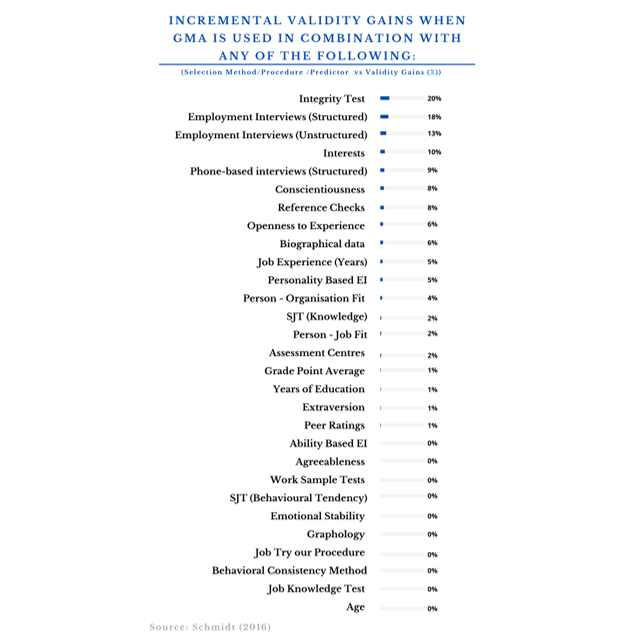Hiring staff is one of the most important jobs for a manager. What worries me is how often managers regret their hiring decisions. I hear so often managers complain that they have hired the wrong person and if only they could have been more thorough at the recruitment stage. Recruitment is the process of finding and hiring the best candidate for each job. In the recruitment process, you will find a very important process called employee selection. This is when you employ tools to choose what you consider to be the best candidates for each job. In this article, I am going to share with you what scientific research says about employee selection methods and what methods work based on scientific evidence.
One of the foremost name globally on research into predicting employee performance is Schmidt. He has written extensively on this subject and is well quoted in both scientific writings and ordinary books on human resources. In 2016 Schmidt, in what I consider to be a seminal article laid bare what every manager need to understand about employee selection. {The Validity and Utility of Selection Methods in Personnel Psychology: Practical and Theoretical Implications of 100 Years of Research Findings}. This paper is an update on the 1998 Schmidt and Hunter paper.
For any selection tool to be considered valid and effective, it must be able to predict actual job performance with a high degree of accuracy. Over and above predicting actual job performance the tools must be able to predict the employee’s ability to learn from training interventions.
Table 1: Selection Procedures/Methods/Predictor ranked by their Operational Validity (r)

Sources: Schmidt (2016)
It is very clear from the above table that GMA (General Mental Ability or also known as cognitive ability or general intelligence) is the biggest predictor of job performance when used alone explaining 65% of the variation in job performance. For those wanting to hire the best talent, the anchor selection methods for you is General Mental Ability tests. Include this procedure if you want to get the best talent. This has always been the case even from previous research. What is evident though is that most of the top countries across the globe use GMA tests when selecting employees. For now, this is what science says and until we get contrary solid scientific evidence we will continue to advocate for these findings. So far I have searched all over, and I have only found this to be the most solid scientific evidence on employee selection methods and their link to actual job performance. The job interview is also solid and is second to GMA. You must however take note that the major drawback for interviews is that they are often not reliable especially the unstructured interviews.
Some of the methods or criteria favoured by managers are age, years of education and work experience. Age has zero relationship with job performance and its anchoring the table above. Surprisingly many managers consider age when hiring staff. Science clearly shows that it is of no use when hiring talent. Years of education with an r = 0.10 and experience at r= 0.16 respectively, shows that the two are not very useful when selecting employees. Again like age, these two are favoured by most managers and all this against scientific evidence. An article by Alison Beard Experience Doesn’t Predict a New Hire’s Success she notes that “Chad H. Van Iddekinge of Florida State University and his colleagues reviewed 81 studies to investigate the link between an employee’s prior work experience and his or her performance in a new organization. They found no significant correlation between the two. Even when people had completed tasks, held roles, or worked in functions or industries relevant to their current ones, it did not translate into better performance. The conclusion: Experience doesn’t predict a new hire’s success.”
If you want to win when hiring staff use the above table to pick what tools that work according to science and incorporate these in your recruitment and selection policies. That way you will be on your way to the top as an organisation.
Table 2: Incremental Validity gains when GMA used in combination with any of the following
When GMA is used as the anchor selection methods and you add on other tools on top, you get validity gains indicated in the table above. The best combination seems to be between GMA and Integrity tests. A combination of those two takes the overall validity to r=0.78. As you can see all the tools with less 5% additional validity to GMA gives no value to your selection toolkit once you combine them with GMA. In designing your policies, it is important to take note of these gains. When you combine structured interviews with GMA you get a combined validity coefficient of r = 0.76.
In conclusion, any serious manager or HR professional who cares about getting the best talent must bookmark this article as a reference when recruiting employees. It may be even necessary to share these findings with the rest of your executive team.
Memory Nguwi is an Occupational Psychologist, Data Scientist, Speaker, & Managing Consultant- Industrial Psychology Consultants (Pvt) Ltd a management and human resources consulting firm.Email:mnguwi@ipcconsultants.com or visit our websites https://www.thehumancapitalhub.com/ and www.ipcconsultants.com



